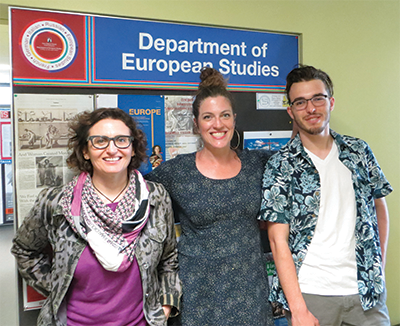
About Our Programs & Centers
Why study another language?
 Beauty in Language Study
Beauty in Language Study
by Clara Cushing // Rhetoric and Writing Studies student
In Europe, 92 percent of students study a foreign language before university. In the U.S., only 20 percent of students do so. Indeed, university enrollment in foreign language classes is declining as people fail to understand language as a public good worthy of public funding.
Clarissa Clò, Ph.D., Chair, European Studies, believes that language study is vital in the 21st century for equity, diversity, and democracy. Studying a second or third language creates a deeper understanding of our postcolonial, globalized world, and it also develops a wide range of skills such as critical thinking, interpersonal communication, self-awareness, and transcultural competence. “There are things about being a human that are important, and learning a language fulfills those types of interests” Clò states. Susanne Forrayi, a former graduate student in French and current French lecturer, poignantly summarizes that learning languages simply makes us “better humans.”
Academic Programs
Students can select from a variety of degree programs. Some programs, such as the B.A. and the minor in European Studies, are designed to give students the broadest possible overview of European culture. Other programs, such as German, Italian, Russian, and French and Francophone Studies, enable students to specialize in select regions and communities. Because language proficiency plays a pivotal role in intercultural and social understanding, the study of languages is an integral part of all degree programs. Students take most of their courses in their target language, and many participate in one of the university’s study-abroad programs. All programs are designed to prepare students for a variety of careers in diplomacy, with government agencies, or in European-centered commerce, communication, arts or the travel industry.
Centers
The following centers are housed at San Diego State University and affiliated with the Department of European Studies:
The Center for European Studies, through its associated faculty and students, is committed to the multidisciplinary study of Europe and its dynamic and evolving calculus of nations, cultures, languages, and perspectives. The center is a vehicle for fostering appreciation an Europe, the societies and cultures within its geographical boundaries, and the ideas that make up various European realities. The center develops grant-funded programs (e.g. colloquia, symposia, etc.), collaborative teaching and research opportunities, faculty exchanges, internship leads for partner programs, workshops, and related activities.
For more information regarding the Center for European Studies, contact Emily Schuckman Matthews in the Department of European Studies at (619) 594-5111 or [email protected].
SDSU created the Language Acquisition Resource Center (LARC) in 1989 to improve the capacity of the university to teach foreign languages more effectively. SDSU’s center has one of the nation’s finest multimedia collections and language laboratory facilities, with digitizing and desktop video conferencing capabilities, a research library, smart classrooms, and faculty offices. The laboratories serve foreign language students in several departments (European Studies, Linguistics and Asian/Middle Eastern Languages, and Spanish and Portuguese).
Visit the LARC web site for more information.